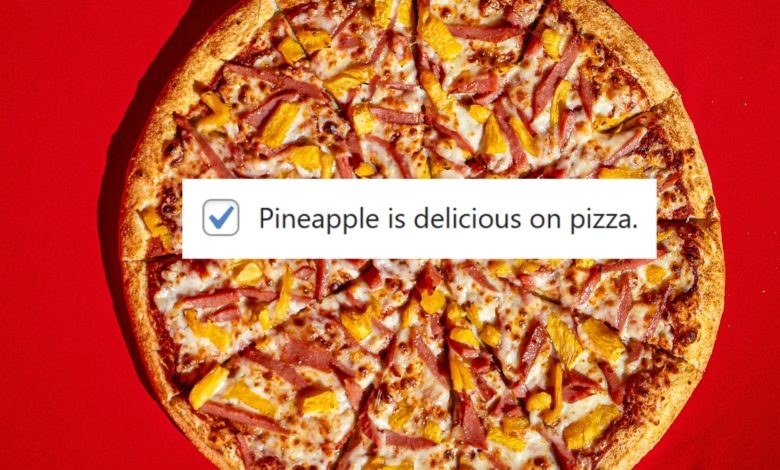To Log Into WordPress, You Now Have To Agree Pineapple on Pizza Is Good

WordPress co-founder and CEO of Automattic Matt Mullenweg is trolling contributors and users of the WordPress open-source project by requiring them to check a box that says “Pineapple is delicious on pizza.”
The change was spotted by WordPress contributors late Sunday, and is still up as of Monday morning. Trying to log in or create a new account without checking the box returns a “please try again” error.

Last week, as part of the ongoing legal battle between WP Engine and Automattic, the company that owns WordPress.com, a judge ordered Mullenweg to remove a controversial login checkbox from WordPress.org that required users to pledge that they were not affiliated with WP Engine before logging in.
Following that order, Mullenweg asked administrators for the Post Status community Slack—which is run by contributors to the open-source WordPress.org project—to delete his Slack account, and his username was changed to “gone 💀.” But he left parting words for the community: “It’s hard to imagine wanting to continue to working on WordPress after this,” he wrote in Slack messages viewed by 404 Media. “I’m sick and disgusted to be legally compelled to provide free labor to an organization as parasitic and exploitive [sic] as WP Engine. I hope you all get what you and WP Engine wanted.”
Mullenweg repeated the sentiment publicly on Friday: “I’m disgusted and sickened by being legally forced to provide free labor and services to @wpengine, a dangerous precedent that should chill every open source maintainer,” he wrote on X. “While I disagree with the court’s decision, I’ve fully complied with its order. You can see most changes on the site. They have access to ACF slug but haven’t changed it… must not have been the emergency they claimed.”
I’m disgusted and sickened by being legally forced to provide free labor and services to @wpengine, a dangerous precedent that should chill every open source maintainer. While I disagree with the court’s decision, I’ve fully complied with its order. You can see most changes on…
— Matt Mullenweg (@photomatt) December 14, 2024
When I first saw a screenshot of the pineapple-on-pizza checkbox screenshot going around on X among WordPress contributors, I thought it must be a joke, or an edited image. Megan, a former WordPress contributor who recently quit because of the uncertainty and instability around the community, told me she thought the same thing. “When I initially saw it I assumed my friend was trolling me but yeah it’s there and has a value attribute filled out, which leaves me suspicious that he’s gonna use it as a proxy for the previous field,” she told me. “Cause everyone knows what was there before; this new field is required as well. I feel like he’s violating the court order, but of course I’m not a lawyer.”
But it’s real. Francesca Marano, Head of Partnerships at Patchstack and a contributor to WordPress for 10 years, told me this is “not the time nor the place” for pineapple-on-pizza jokes. “WordPress is the most used CMS on the web, and we have a responsibility to act like professionals. It’s disheartening to see an OSS project that thousands of people have contributed to over 21 years reduced to behaviours more suited to a kindergarten,” she said. “Over the years, plugin and theme authors, contributors, and users have requested a myriad of features. However, those ideas often went nowhere because there were not enough resources or there was no consensus. But it’s ok to put a checkbox up just for fun in a matter of hours.” On Trac, which tracks changes on the WordPress project, Marano pointed out that the change is visible and anyone can see it was made late on Sunday.
“Most people will check it and access their .org profile to ask or answer questions in the forum, update their plugin or theme, etc. But what about those who won’t and have their product in the repository? Not only is it shameful, but it’s also a security risk,” Marano said. “Where are the adults in the room?”
The Repository, an independent media outlet that covers WordPress, reported last week that a group of WordPress contributors issued an open letter titled “Dear WordPress community: We stand with you.” In it, the contributors “raise objections about governance, transparency, and decision-making processes,” the Repository wrote. “They highlight concerns about ‘double standards,’ including Mullenweg’s lack of accountability under the project’s Code of Conduct and the executive director’s direct employment by Automattic.”
Following the preliminary injunction order, CEO of WordPress VIP Nick Gernert wrote on the company blog that Automattic is focused on “keeping WordPress strong and forward-thinking.”
“We want to reassure you that there will be no change in the level of service you receive from WordPress VIP,” Gernert wrote. He didn’t address in the blog why there would be a change or what has happened to require a reassuring blog post to begin with. “Our platform continues to deliver the exceptional security, stability, and performance that your business depends on. We are here to ensure your operations proceed without disruption.”
Automattic and Mullenweg did not immediately respond to a request for comment.


